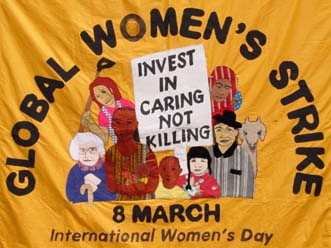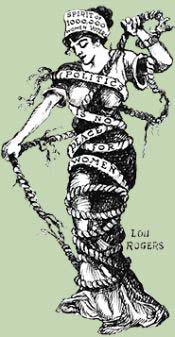 |
Seeking to end poverty and to put an end to war, fighting for a living wage for all of our work, and continuing the struggle to achieve pay equity in the global market, each March 8th, on every International Women’s Day since 2000 — and again in 2005 — women in over 60 countries will, and have, engaged in grassroots organizing activities to demand together that society invest in caring not killing, that the money squandered on wars across the globe instead be directed to the needs of our communities.
The demands of the global women’s strike — a day when women do neither paid, nor unpaid work — include …
- Payment for all caring work — in wages, pensions, land and other resources.
- Pay equity for all — women and men — in the global market.
- Food security for breastfeeding mothers, paid maternity leave and maternity breaks.
- Accessible clean water, healthcare, housing, transport and literacy.
- Non-polluting energy and technology.
- Protection and asylum from all violence and persecution, including by family members and those in positions of authority.
- Freedom of movement.
 Nothing in life is to be feared. It is only to be understood. Marie Curie |
From Ghana, where women and girls have taken to the street of Anum to demand an end to war, and support for issues of importance to women; in Guyana, where multi-racial demonstrations have protested against the country’s 25-year history of racial segregation and violence; in India, where mass rallies and workshops of Tribal and Dalit women have demanded an end to the wage discrimination of the caste system, and an end to rape by individual men, employers and the police; in Uganda, where rural women have won free and accessible healthcare, the right to clean water close to their homes, and the respect of their husbands; to Peru, where domestic workers’ organizations in Lima took over a community radio station to press the government to implement legislation to provide benefits and rights to domestic workers — strike action has brought about needed change and empowered women, children and men to take more, and increasingly effective, action to create a more caring, just and equitable world.
Change comes slowly, but change comes only through action and struggle.